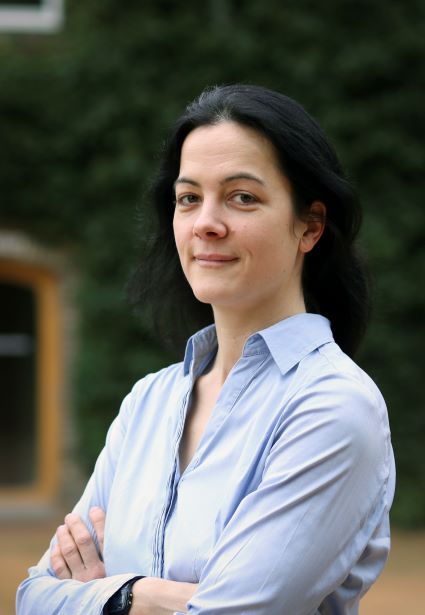A teacher’s perspective on the role as course coordinator
Teaching is one of the most essential tasks at Aarhus University. Each year, AU offers more than 4,400 courses. As a course coordinator at AU, you are not only a teacher; you are also a course designer, manager, and administrator. We talked to one of the many course coordinators at AU. She explains how she works to ensure an overview and common thread for the students.


“There are many different ways to be a course coordinator. Mostly only one person is in charge of their course, and the coordination part mostly consists of administration. However, sometimes there are two or more teachers. Our course may be a bit unusual because there are so many different teachers and visiting lecturers."
This is the story of Jessica Aschemann-Witzel, professor at Aarhus BSS, who is a teacher and coordinator of the course Sustainable Production and Consumption – The Cross-Disciplinary Challenge. According to her, course coordination includes many different things, depending on how big a course is, concerning both the number of students and the number of teaching staff.
The course, which Jessica Aschemann-Witzel coordinates, consists of a teaching group of five and is founded on the inclusion of different perspectives from, for instance, external companies. Around 100 students attend the course that has been running for the second time in the autumn semester of 2021.
"In fact, the course is four courses in one because there is both a bachelor's and master's course and both have a version at five ECTS and 10 ECTS. I was observing that there were so many students who wanted to know more about sustainability, and we wanted to offer something for all of them," Jessica Aschemann-Witzel says about the course.
Sustainability calls for collaboration
The desire to offer a new course on sustainability across different areas of expertise is one of the driving forces behind the course and its setup. The setup calls for relatively many different academic competencies from the teaching team.
"The idea was to try to make a very interdisciplinary course. Both the students and teachers come from different disciplines because the idea is that sustainability goals can only be achieved interdisciplinarily," Jessica Aschemann-Witzel says.
She explains that the first idea was to include even more different disciplines in the course than what turned out to be practically possible. However, the course is still built around a series of lessons with several invited speakers from the society and corporate world.
When academic ambitions and practical solutions need to be reconciled
To unite academic and pedagogical ambitions with a practical reality into excellent solutions is one of the things that Jessica Aschemann-Witzel and her colleagues have had to work with on several fronts.
"At the beginning, we wanted some lectures to be open to the public. If you invite some interesting people to talk about an exciting topic it would be great if we could open up a big lecture theatre for people from all over Aarhus."
However, COVID put an end to that idea as the entire first run-through of the course ended up taking place online. Still, this turned out to be an excellent format for the course, and in the past semester, Jessica Aschemann-Witzel and her colleagues have held a combination of both online and on-campus lectures as the flexibility has benefited both the guest lecturers and students.
Creating a common thread in a complex course setup
Since Jessica Aschemann-Witzel and her colleagues have decided to design the content of the course as a combination of different specialist presentations – partly by Jessica Aschemann-Witzel and her colleagues and partly by guest lecturers – they are aware that this poses some challenges to the students’ learning outcome. According to Jessica Aschemann-Witzel, experience shows that when several different teachers teach, more students lose track of the course.
"The challenge is to make sure that each student receives the information that is relevant to them. Therefore, we make sure that students who follow the course at five ECTS know that I am the only one who will assess their exams. So when they have questions, they ask me. This creates a common thread. For those who take the course at 10 ECTS, we are a team of supervisors who each have our own group of students and meet with them during the semester, "Jessica Aschemann-Witzel says.
She adds that it is the responsibility of the supervisor to ensure that the group meet and reflect on the topics and content of the presentations – and they supervise the groups’ exam projects.
"The aim is to have the students reflect on and understand the connection between the many different topics that they are introduced to by the teaching staff from different disciplines."
Course coordination can be a jigsaw
A course with different teachers requires a lot of extra planning. Jessica Aschemann-Witzel and her colleagues have had regular coordination meetings both before, during, and after the semester, where they have done detailed planning.
"Some of it was in August where we planned the course in detail, fine-tuned the literature, and agreed on who contacted which visiting lecturers. We also had a meeting, before the first introductory meeting with the students, where we discussed, for example, who facilitated the formation of groups, presented the overview of the course, and written assignments."
According to Jessica Aschemann-Witzel, one of the major challenges has been to assess the students’ exams on a qualified basis across the teaching group because of the intricate nature of the course. Thus, it was important to meet before the first round of supervision, before the exam assessment, and after the exam to discuss the results and what can be done in the future to ensure an even more aligned assessment.
How to coordinate courses both well and efficiently
On Sustainable Production and Consumption – the Cross-Disciplinary Challenge, both the potential and challenge of the organisation of the teaching has been the sheer number of teachers involved. According to Jessica Aschemann-Witzel, when planning this type of course the balance between time and quality is essential.
"I think it is very important to meet up. It works well. The problem is perhaps – and this is something more general – that the more teachers you involve in a course, the more people you have to coordinate. Evidently, that takes time."
For the same reason, Jessica Aschemann-Witzel has taken on the task of laying down the overall guidelines of the course, which her colleagues have then reviewed and quality assured.
"In our case, I think it was the best solution to have someone make a general plan and then let the rest of the team offer suggestions and adjustments," she says, and further explains that the more iterations, the more it will be embedded in both her and her colleagues’ practice. Thus, over time, it will require fewer resources to plan.
Increased focus on competency development within course coordination
With Universities Denmark’s Danish framework for recognising the merits of university educational competencies, there has been an increased focus on competencies within collegial cooperation and degree programme management as an element of educational competency development.
"At the CED, we have started considering how to best support the teaching staff at AU in developing their competencies within, among other things, course management. This is done in the acknowledgement of the course coordinator, who has an essential task of ensuring high-quality teaching and excellent collaboration with and between lecturers and student instructors, as well as the study administration and anyone else involved in the management of the programme," says Liza Strandgaard who is the division manager at the Unit for Teaching Development at the CED.
Since the turn of the year, the CED has increased its focus on researching programme management from an application-oriented perspective. In addition, an educational competency development offer will be developed and tested for course coordinators and others who have similar programme management tasks without formal managerial responsibilities.
"We hope this will support the departments and schools’ future efforts to ensure that the teaching staff are actively engaged in continuous educational competency development and their career ambitions," concludes Liza Strandgaard.
